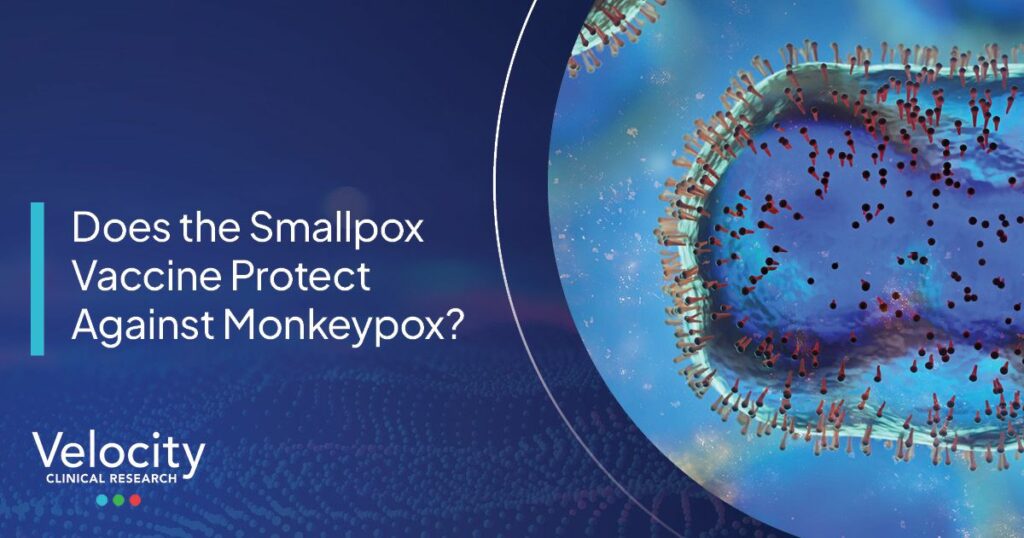Featuring Commentary by Brandon Essink, MD, CPI, Chief Physician Officer at Velocity
Monkeypox has made headlines lately as a new outbreak is steadily growing in the United States. In this article we’ll answer common questions about the virus and the vaccine intended to prevent infection with the help of Brandon Essink, MD, CPI, Velocity’s Physician Officer and a renowned Principal Investigator for vaccine trials.
What is Monkeypox?
Monkeypox is a virus that presents as a rash of raised bumps on the skin, like pimples or blisters, called pox, that can be very painful and/or itchy. These bumps generally arise around the genitals, but can spread to other skin around the body.
Generally, symptoms arise within 3 weeks after exposure to the virus, starting with flu-like symptoms including fever, chills, swollen lymph nodes, exhaustion, muscle aches, backache, headache, and respiratory symptoms (sore throat, nasal congestion, or cough) before developing a rash 1-4 days later.
The CDC says that “Monkeypox can be spread from the time symptoms start until the rash has healed, all scabs have fallen off, and a fresh layer of skin has formed. The illness typically lasts 2-4 weeks.”
The virus is not deadly, but is contagious, and can be very painful. The healed pox can sometimes leave scars or discoloration that could be permanent.
What is Smallpox?
Like monkeypox, smallpox causes raised bumps starting in the mouth and on the tongue, accompanied by high fever, occasional vomiting, and head and body aches. After the initial stage, the pox spread to the skin, and last approximately 3 to 4 weeks before completely scabbing over and falling off.
Unlike monkeypox however, smallpox is a very dangerous and deadly virus. Up to 30% of people who contracted smallpox died from systemic shock, or body-wide infection, including blood infection (toxemia). Those that survived smallpox tended to develop scars in place of the healed pox.
Thankfully, smallpox was declared eradicated from natural occurrences in 1980 with the success of the mass vaccination campaigns the previous two decades.
Why does the smallpox vaccine protect against monkeypox?
While smallpox and monkeypox are similar, they are not the same. Both smallpox (variola virus) and monkeypox are members of the genus orthopoxvirus. Because they’re from the same family of viruses, the FDA-approved smallpox vaccine, JYNNEOS, can provide protection against monkeypox infection.
“The smallpox vaccine — which does offer protection against monkeypox — was a routine vaccine for children in the US prior to 1972. So, we do have an FDA-approved vaccine for smallpox and monkeypox, though it has long been out of the normal vaccine cycle.” — Dr. Brandon Essink, Chief Physician Officer, Velocity Clinical Research
Who has received a smallpox vaccine?
Before 1970, most children in the US were vaccinated against smallpox as part of the regular schedule of vaccines. Once the virus was eradicated, however, the vaccine was removed from the schedule. So, generally, the only people who have received a smallpox vaccine since 1972 have been people who work in labs that regularly work with viruses, and those in the military.
Where can I get a smallpox vaccine?
To obtain a vaccine for monkeypox and smallpox, visit your local health department’s website. Currently, smallpox vaccines are in high demand, so most doses are saved for those with direct exposure, or at high-risk for exposure.
Additionally, Velocity is currently conducting clinical trials involving the smallpox vaccine. To learn more about this study, or to see if you qualify for a clinical trial with Velocity, use the clinical trial finder.
“The generation that did get the vaccine may still be susceptible because of waning immunity. We may start seeing strategies that involve primary vaccinations for high-risk people, and booster vaccinations for high-risk seniors.” — Dr. Brandon Essink, Chief Physician Officer, Velocity Clinical Research
Where can I learn more about monkeypox?
The Centers for Disease Control and Prevention – Monkeypox https://www.cdc.gov/poxvirus/monkeypox/index.html
The Centers for Disease Control and Prevention – Smallpox https://www.cdc.gov/smallpox/about/index.html

